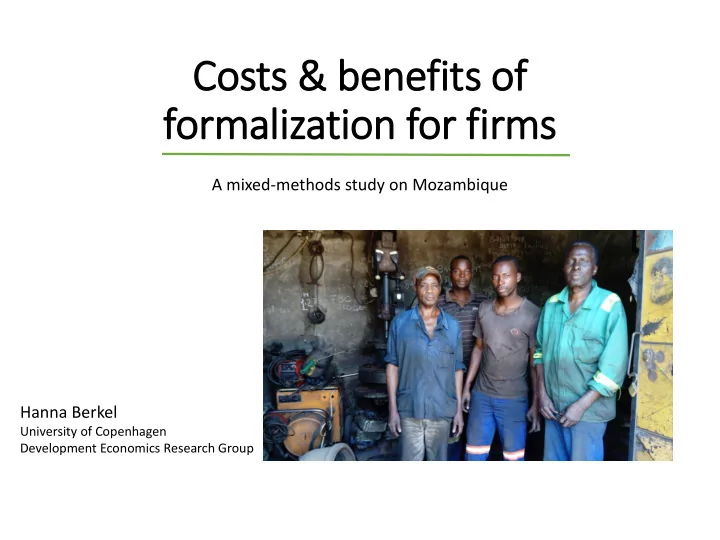

Costs & benefi fits of f formalization for fir irms A mixed-methods study on Mozambique Hanna Berkel University of Copenhagen Development Economics Research Group
Problem statement • GoM’s goal: formalization of informal sector • Backed by ILO, World Bank etc. • Formalization beneficial for governments • But: outcomes for firms? • Research comes to mixed results • Few studies on the topic for Mozambican firms
Research Questions • What are the costs and benefits of formalization for firms? • What are actual outcomes of formalization for firms? (Quant) • What effects of formalization do firm owners perceive? (Qual) • How do firms experience bureaucratic procedures? (Qual)
Literature • Definition of (in)formality • Panel datasets, matched DD approach (e.g. Rand&Torm, 2012) • Benefits outweigh costs • Formalization experiments (Mc Kenzie et al, several years) • Firms benefit, but costs often outweigh benefits • Qual: formalization outcomes heterogeneous • Local authorities beneficial, national authorities less relevant • Informal practices of formal firms
Conceptual framework
Methodology
Quant dataset and analysis • Panel dataset (2012, 2017) • 516 firms for both years • First two (in)formality degrees are analysed as one • Due to missing questions on local licenses in survey • Mixed DD approach compared with FE estimates • Impact of formalization on intermediate outcomes
Transition of (in)formality degrees 2017 1&2 3 4 Fully informal or NUIT INSS (in)formal Observations license (in)formal (in)formal 1&2 Fully informal or license 75 26 10 111 (in)formal (14.53) (5.04) (1.94) (21.51) 2012 3 NUIT (in)formal 82 71 47 200 (15.89) (13.76) (9.11) (38.76) 4 INSS (in)formal 8 14 183 205 (1.55) (2.71) (35.47) (39.73) Observations 165 111 240 516 (31.97) (21.51) (46.51) • 83 firms formalized to (3) or (4) from (1&2) or (3) • 104 firms informalized to (1&2) from (3) or (4)
Qual dataset and analysis • 16 experts and government officials • legal situation of firms • costs and benefits of formalization that may exist in Mozambique • 16 firms from four different (in)formality degrees (strata) • Firms that were enquired during quantitative data collection • Semi-structured interviews with firm owners • Participant observation • Qual distinguishes between four (in)formality degrees
Quant results (i) • Formalization to (4) leads to: • Significantly higher likelihood to do business with formal companies => benefit • Significantly higher likelihood to provide formal work contracts => cost or benefit? • No statistical significance for other intermediate outcomes Table 1: Intermediate outcomes and full formality (4), matched DD estimates Investments Formal Credit Inspections Sales to Casual Formal accounts state labor contracts enterprises A: Levels specification – 0.104 0.133 0.143* 0.210** 0.343*** -0.54 0.369*** firm-specific controls (1.15) (1.60) (1.86) (2.05) (4.65) (-1.61) (3.47) only B: Levels specification – 0.047 0.149* 0.096 0.163 0.341*** -0.232** 0.314*** full set (0.50) (1.82) (1.41) (1.53) (4.61) (-2.19) (3.01) C: Difference and levels -0.0899 0.093 0.098 0.168 0.298*** -0.124 0.397*** specification (-0.95) (1.14) (1.52) (1.63) (4.40) (-1.44) (3.54) Total observations 308 308 308 308 308 308 299 Treated observations 54 54 54 54 54 54 45
Quant results (ii) • Informalization to (1&2) leads to: • Significantly lower likelihood to do business with formal companies => losing benefit of formality • Significantly lower likelihood to be inspected => saving cost of formality • No statistical significance for other intermediate outcomes Table 2: Intermediate outcomes and informalization to (1&2), matched DD estimates Investments Formal Credit Inspections Sales to Casual Formal accounts state labor contracts enterprises A: Levels specification – -0.085 0.018 -0.053 -0.223** -0.263*** 0.152 -0.241** firm-specific controls (-0.91) (0.30) (-0.89) (-2.27) (-4.65) (0.97) (-2.88) only B: Levels specification – full -0.034 -0.001 -0.134** -0.182** -0.337*** 0.170 -0.289*** set (-0.39) (-0.02) (-2.28) (-2.02) (-6.33) (1.13) (-3.88) C: Difference and levels 0.057 0.010 -0.114** -0.116 -0.252*** 0.066 -0.247*** specification (0.62) (0.18) (-2.12) (-1.20) (-4.44) (0.47) (-2.99) Total observations 402 402 402 402 402 402 389 Treated observations 87 87 87 87 87 87 74
Qual results (i) • Costs and benefits of formalization depend on (in)formality degree • Valid for all degrees: • Benefit: legal recognition • High costs: time and money • Non-existent benefit: Access to credit • Costs and time of initial registration impossible to assess previously • De facto practices differ from de jure regulations • More informal firms do not have necessary financial reserves/connections to register
Qual results (ii) • Fully informal firms (1) • Lack of information • Lack of regular cash inflows • Few perceived benefits, many perceived costs • Won’t benefit from formalization • License (in)formal firms (2) • Heterogeneous group; some similar to (1) • Lack of information on how to implement perceived benefits • Lack of information about potential costs of formalization (inspections) • Some have potential to benefit by selling to state enterprises • Generally, too few benefits
Qual results (iii) • Tax (in)formal firms (3) • Save costs of full formalization by employing casual labour => reason for survival (?) • Benefit from doing business with formal firms • Rational trade off benefits against costs • Fully formal firms (4) • Impossible to avoid full formality due to high public visibility • High inspection and labor costs • Informal practices: hiring of casual labor • Few benefits, high (but bearable) costs
Conclusion • Only few benefits of formalization existing in Mozambique • Some have necessary conditions to benefit • Lack of information impedes firms to benefit • High costs of formalization • Difficult for survivalist entrepreneurs to bear these costs • High inspection costs for bigger firms • Different policies necessary • Increasing of benefits not enough => dissemination of information/education important • Fight against corruption
Thank you!
Recommend
More recommend